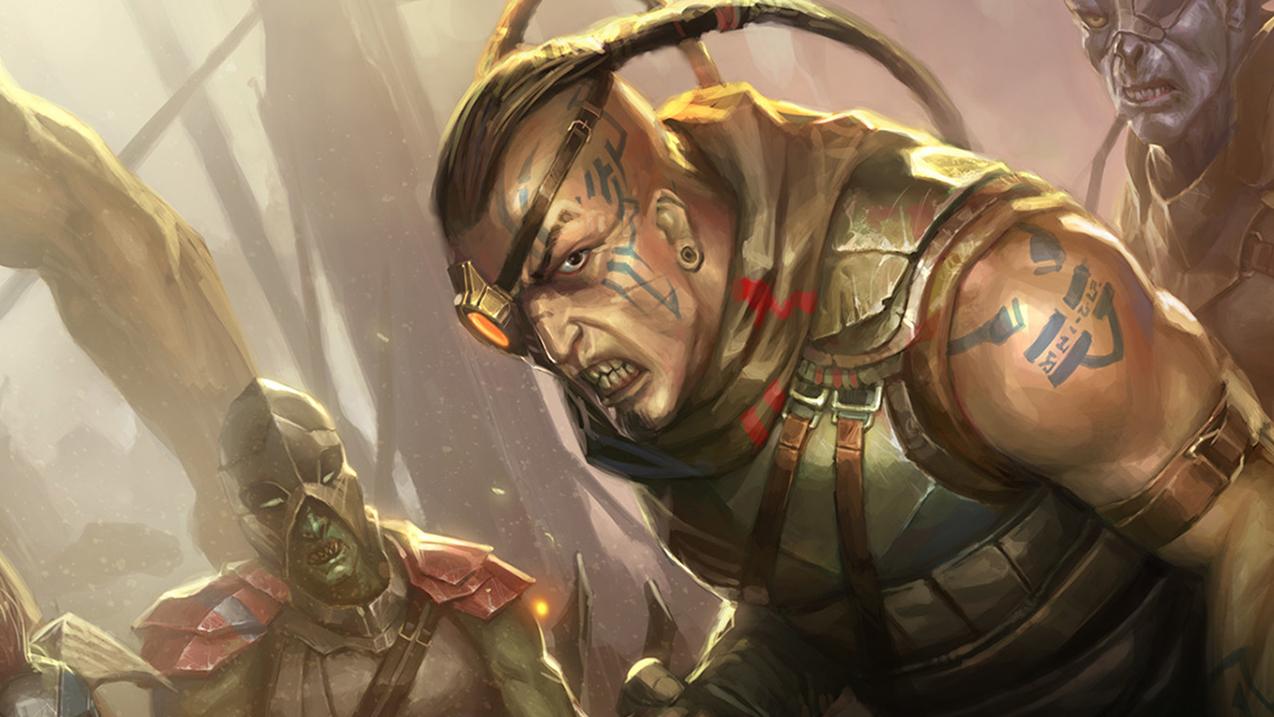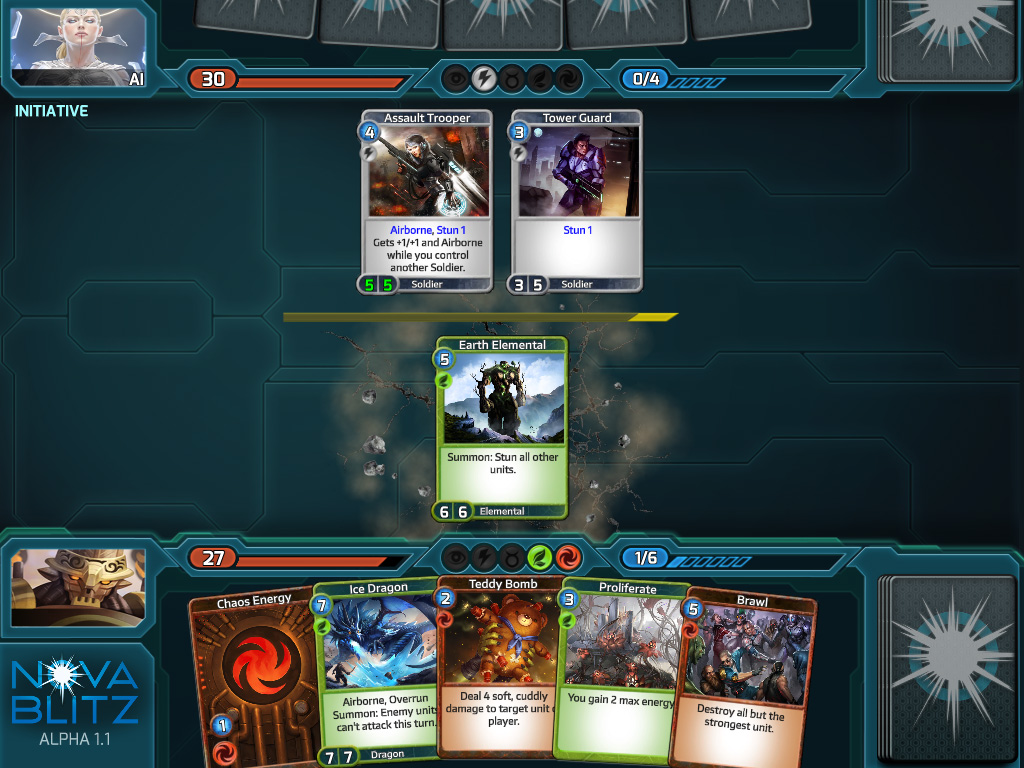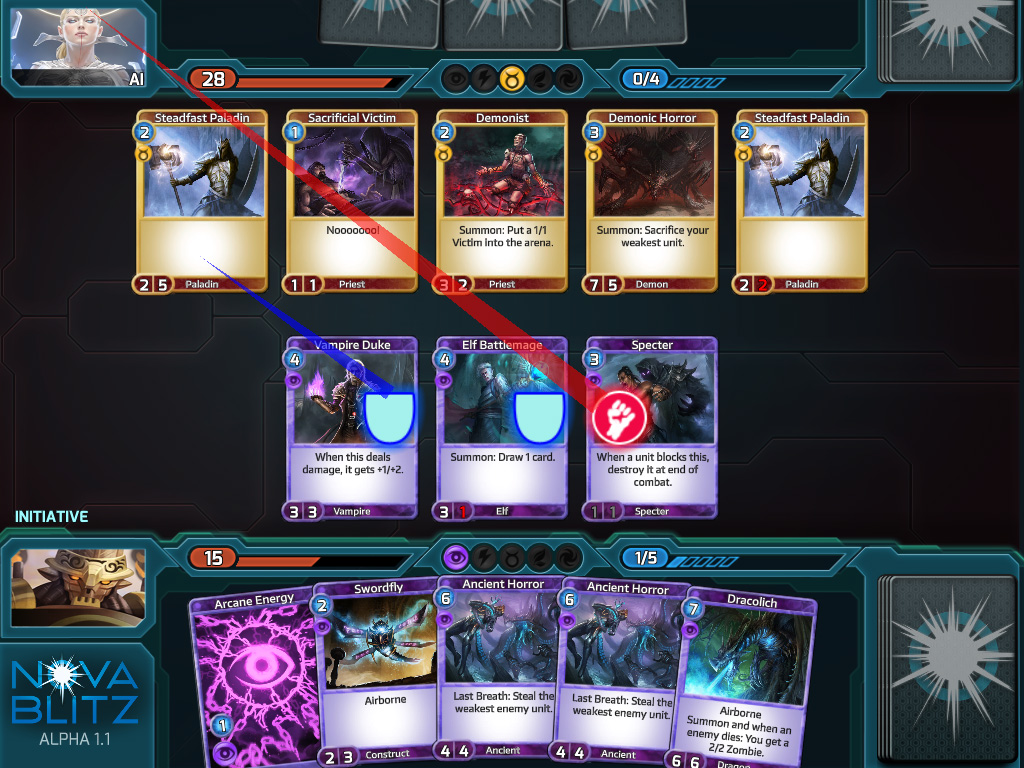
Anyone who’s played Hearthstone has inevitably been matched against 'that person'—the one who takes the full 75 seconds of their turn every single time, regardless of the cards in their hand or the state of the board. It can turn a regular game into a long, tiresome experience. Knowing that feeling all too well is what made the concept of Nova Blitz so intriguing to me: It's a digital CCG (collectable card game) in which players take their turns simultaneously.
Playing a card before your opponent gives you ‘initiative’ and lets your units attack first, but playing a card second lets you watch what your opponent does and react accordingly. And react you will, as it felt like there were about as many removal cards as there were unit cards—meaning reactions were swift and frequent.
Nova Blitz’s simultaneous turns create some interesting choices I haven’t seen in a card game before. Aggressive units will gain buffs if you have initiative, but playing them means you don’t get a chance to see what your opponent has planned. Playing slowly gives up initiative, but lets you respond at your own pace. This is the first card game I’ve played where the playstyle of your deck affects the actual speed you want to play at, and developer Dragon Foundry has done a good job of creating cards and effects that take advantage of this mechanic. If your opponent plays a unit that is buffed by having initiative, it may change the pace you want to play at—otherwise you’ll risk taking extra damage.

I make comparisons to Hearthstone and Magic: The Gathering, but only as a point of reference—none of this is to suggest that Nova Blitz is a "Hearthstone ripoff," as someone inevitably says about any new card game.
A lot of CCGs, digital and physical, share core mechanics with the godfather of card battling games, Magic: The Gathering. But even small changes in design have massive impacts on how a game plays. If we look at Hearthstone’s ‘minions’ compared to Magic’s ‘creatures’, they are very similar. But seemingly small changes—like minions keeping the damage done to them—fundamentally affect what makes a card good or bad. The value of certain stats and abilities change, influencing strategy, deck building, and card design.
With Nova Blitz, units also keep any damage done to them, but attacking is done differently. It’s closer to Magic, but simultaneous turns make it play out different. Hearthstone is the top dog, so it’s easy to broadly stand competitors up against it. But sweeping comparisons between CCGs can usually be followed up with “except you play them totally differently.”
There is one downside. Anybody who’s played against a Blue-Black control deck in Magic: The Gathering understands the rage-inducing effect too much removal can have. When your opponent has immediate answers to anything you play, it can sometimes feel like you aren’t actually part of the game. It’s one of the main reasons Blizzard is adamantly against Hearthstone cards that mess with your opponent’s hand, and why there are some effects secrets—the only way to affect your opponent’s turn—will never have. Having power taken away from you, especially on your own turn, isn’t a fun feeling. In fact, it’s a screw-you-I’m-gonna-take-my-cards-and-going-home feeling.
Unfortunately, I found myself constantly frustrated by the amount of cards with removal effects, at least in the basic decks I had a chance to play. There are so many ways to kill units that when I played one before my opponent, it was often followed by watching that unit instantly die. As I mentioned earlier, having power taken away from you on your own turn is a frustrating experience in any card game, and it’s always your turn in Nova Blitz. The removal cards are very similar in cost and effect to other CCGs, but the experience of playing a unit quickly only to watch it disappear in the same turn feels significantly more punishing. Even if it would have played out identically in Hearthstone or Magic, it feels worse.
No more waiting for turn-timers, long animations, or distracted opponents.
I really admire what Nova Blitz is trying to do: cut the thumb-twiddling out of digital card games. No more waiting for turn-timers, long animations, or distracted opponents. You throw down cards and the game unfolds. I was able to play multiple matches of Nova Blitz in the same time I would have spent on a single game of Hearthstone. In the thick of a match, I found myself having to quickly assess my priorities and forcibly cut my thinking short so I could play faster. It felt more like a Boxing match than a Chess game, as the cards my opponent played would force me to adapt on the fly.
The alpha I played was definitely unfinished on the technical side. I could only play in a small, square window, and many of the menus and interfaces were cluttered and rough looking. But that’s the sort of thing an alpha is for, and I’m sure adding a few layers of polish is on Dragon Foundry’s to-do list. Nova Blitz is a great concept that made me change the way I usually think during a card game. With time and iteration—and maybe some more thought on the demoralizing effect of instant removal—Nova Blitz could become a unique and fun option in the quickly growing library of digital card games.
The biggest gaming news, reviews and hardware deals
Keep up to date with the most important stories and the best deals, as picked by the PC Gamer team.
Nova Blitz will be free-to-play and was recently Greenlit on Steam. You can download the alpha and try it for yourself right here.



